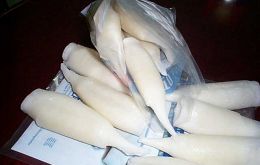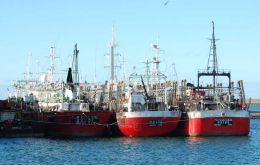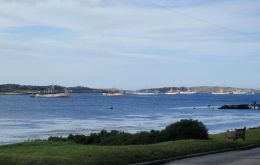MercoPress. South Atlantic News Agency
Fisheries
-
Friday, May 28th 2010 - 04:31 UTC
Ancestors of modern squid identified by Canadian researchers

The ancestors of modern squid may have existed half a billion years ago - a lot earlier than previously thought. In a new study, Canadian researchers identified a previously unclassifiable fossil that was long believed to belong perhaps to the shrimp family.
-
Thursday, May 27th 2010 - 23:47 UTC
Argentina confirms poor squid season and closes fishery south of parallel 44

Argentina’s squid fishery to the south of parallel 44º was closed last Friday. The measure adopted by the Federal Fisheries Council (CFP) follows scientific information furnished by the National Institute for Fisheries Research and Development (INIDEP).
-
Tuesday, May 25th 2010 - 06:15 UTC
US declares “fishery emergency” in the Gulf of Mexico because of BP oil spill

United States Commerce Secretary Gary Locke on Monday declared a fishery disaster in the Gulf of Mexico because of the economic impact of the Deepwater Horizon oil spill on fisheries in the region.
-
Saturday, May 22nd 2010 - 00:29 UTC
Ban on bi-valve molluscs extraction along Buenos Aires province coastline

Argentina’s province of Buenos Aires re-confirmed on Friday the total ban of commercial, artisan and/or visitors’ extraction of bi-valve molluscs along the South Atlantic coast of the province.
-
Saturday, May 22nd 2010 - 00:28 UTC
UN Environment Program questions ‘free market” policies for global fisheries

UN's top environment official has echoed warnings that commercial fishing could be destroyed within 50 years. “It is not a science fiction scenario. It is within the lifetime of a child born today,” said Achim Steiner, head of the UN Environment Program (Unep).
-
Saturday, May 22nd 2010 - 00:15 UTC
An estimated 26 million tons of fish illegally landed every year, warn researchers

Global measures to regulate the fishing industry lack the capability to tackle illegal catches, warn researchers. Writing in the journal Science, they say that up to 26 million tons of fish, worth an estimated 23 billion USD are landed illegally each year.
-
Thursday, May 20th 2010 - 06:41 UTC
Argentina could extend “biological shutdowns” to conserve hake

Argentina is reassessing measures for the conservation of common hake resources and could extend the so called “biological shutdowns” which force the fleet to remain in port for a determined period of time, according to Norberto Yauhar, head of the Argentine fisheries and aquaculture Sub-secretariat.
-
Thursday, May 20th 2010 - 03:36 UTC
Spanish fishing companies could leave Patagonia: high costs and poor catches

Spanish fishing companies, mostly from Galicia, operating in Argentina Patagonia are seriously considering leaving the country because of standing labour unrest, lack of national and provincial fisheries policies, the end to export reimbursements and above all a dramatic drop in common hake and squid catches.
-
Tuesday, May 18th 2010 - 00:16 UTC
European Commission launches discussions on fishing limits and sustainability

The European Commission published Monday its report launching discussions on fishing opportunities in EU waters in 2011. The document sets out how the Commission intends to act on the scientific advice it receives on the state of fish stocks when proposing catch limits and quotas for next year.
-
Thursday, May 13th 2010 - 21:09 UTC
Korean Jigger Operating in Falklands’ Waters to be Broken Up in Punta Arenas

Chilean authorities in the extreme south of the country have decided to deny port access in Punta Arenas to a Korean flagged jigger which arrived from the Falkland Islands having suffered extensive damage following a fire in the engine room. Her fate seems to be breaking her up.
